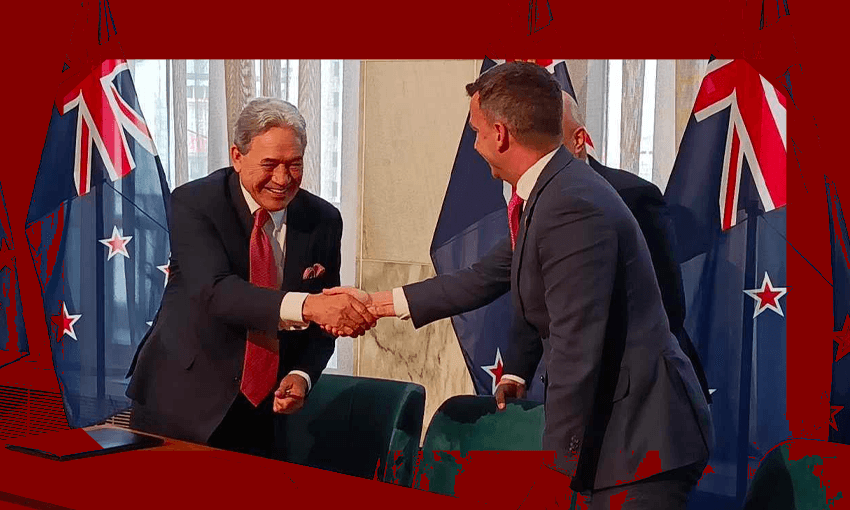Finally, we have a new government. Here are the key details from the coalition agreement between National, Act and NZ First.
New Zealand’s first-ever three-party coalition government was announced this morning, after the second-longest negotiation period in New Zealand MMP history. Here are the key details of the National-Act-NZ First deal (which is actually two separate agreements, one between National and Act and one between National and NZ First).
David Seymour and Winston Peters will share the deputy PM role
Peters berated a reporter for asking about a shared deputy prime minister role, insisting that they weren’t sharing it. Unfortunately for Peters, splitting the role in half by time is still sharing. The respective leaders of Act and New Zealand First will each get a go at being deputy to prime minister Christopher Luxon. Peters will take the first half of the three-year parliamentary term, and Seymour the second.
Act and NZ First each get three ministers inside cabinet
Seymour will take on the new role of minister for regulation, while Peters will be foreign affairs minister and racing minister.
Act’s Brooke van Velden will be minister for workplace relations and safety and minister for internal affairs, Act’s Nicole McKee will be minister for courts, NZ First’s Shane Jones will be regional development minister and NZ First’s Casey Costello will be customs minister and minister for seniors.
Act also gets two ministers outside cabinet and NZ First one. They each get a parliamentary under-secretary too.
National’s Nicola Willis will be finance minister, Gerry Brownlee will be speaker, and Judith Collins will be attorney-general.
The policy agenda
Some key policy agreements include:
- National’s foreign buyer tax – which was the party’s much-criticised plan to recoup revenue for a slate of tax cuts – is off the table, according to its agreement with NZ First. National’s proposed tax cuts will continue – funded by a “combination of spending reprioritisation and additional revenue measures”.
- Act’s “red-tape reduction” policy has been adopted in the form of a new regulation agency, which will be funded by the disestablishment of the Productivity Commission. David Seymour will be the minister for regulation and a law, the Regulatory Standards Act, will be passed.
- NZ First has secured a $1.2 billion regional infrastructure fund, a throwback to Shane Jones’ controversial Provincial Growth Fund in the 2017 Labour-NZ First government.
- A Treaty principles bill based on existing Act policy – which aims to define the principles of the Treaty of Waitangi – will be supported up to select committee stage. As per the NZ First agreement, all legislation (except settlements) that refers to the principles of the Treaty will be reviewed.
- As per the Act deal, the public sector will be shrunk back to 2017 levels “by reducing non-essential back office functions”.
- The “partnership schools” or charter schools programme will be reintroduced, with a policy to allow state schools to become partnership schools.
- NZ First has secured an inquiry into how the Covid-19 pandemic was handled in New Zealand.
- The ban on cold medicine containing pseudoephedrine will be lifted.
- The restoration of interest deductibility for landlords will be sped up, with Act’s tenancy law proposals such as a “pet bond” introduced.
- Act has secured a review of the firearms registry, and the Arms Act will be rewritten.
What happens now?
New ministers will spend the weekend moving into their new Beehive digs before being sworn in on Monday at Government House; a ceremonial meeting of the new cabinet will take place later that day. Parliament will resume on December 5.





